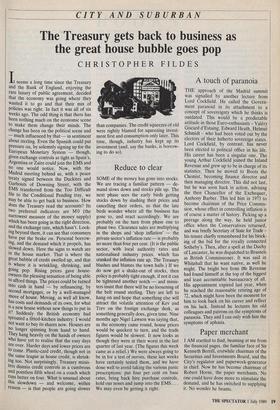A touch of paranoia
THE approach of the Madrid summit was signalled by another lecture from Lord Cockfield. He called the Govern- ment paranoid in its attachment to a concept of sovereignty which he thinks is outdated. This would be a predictable attitude in those Euro-enthusiasts – Valery Giscard d'Estaing, Edward Heath, Helmut Schmidt – who had been voted out by the electors of their hitherto sovereign states. Lord Cockfield, by contrast, has never been elected to political office in his life. His career has been a singular one. The young Arthur Cockfield joined the Inland Revenue and grew up to be in charge of its statistics. Then he moved to Boots the Chemist, becoming finance director and then managing director. This did not last, but he was soon back in action, advising the then Chancellor of the Exchequer, Anthony Barber. This led him in 1973 to become chairman of the Price Commis- sion, whose effect in controlling inflation is of course a matter of history. Picking up a peerage along the way, he held junior office when the Conservatives returned, and was briefly Secretary of State for Trade his tenure chiefly remembered for his block- ing of the bid for the royally connected Sotheby's. Then, after a spell at the Duchy of Lancaster, he was dispatched to Brussels as British Commissioner. It was said in Whitehall that he want native, as well he might. The bright boy from the Revenue had found himself at the top of the biggest and least accountable bureaucracy of all. His appointment expired last year, when he reached the reasonable retiring age of 72, which might have been the moment for him to look back on his career and reflect on his luck. Instead he lectures his old colleagues and patrons on the symptoms of paranoia. They and I can only wish him the symptoms of aphasia.










































 Previous page
Previous page